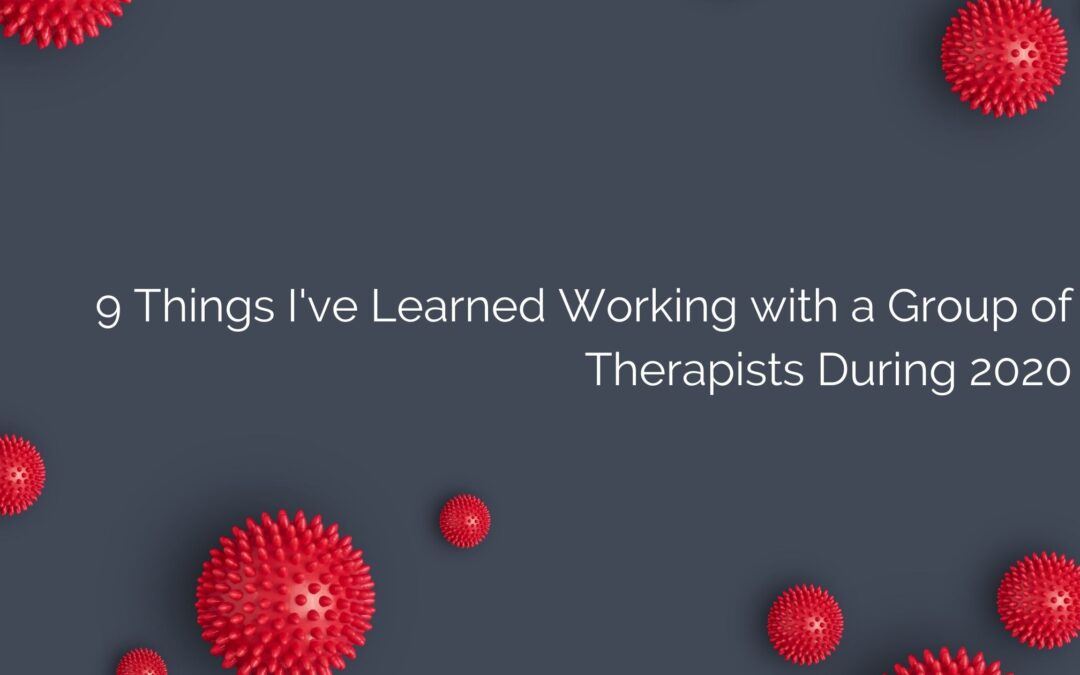This year has been tough to say the very least. It seems like everyone I know has been hit by so many big and little things in their lives, which is on top of the pandemic and other current stressors. All of these things coming together at once is compounding everyone’s stress levels and having a huge impact on everyone’s mental wellbeing. How could it not? The pandemic has upended our routines and normal lives and we still have to deal with regular stress of daily life. But, amazingly, during all of this I have learned how to manage stress and anxiety more effectively than I ever have before. My secret? I have the honor of being behind the scenes practice manager to an incredible team of therapists. The way that they have supported each other, their clients, and their own communities has made a lasting impact on me and how I take care of myself, my family, and my own community.
These are a few of the things I have learned working with a group of therapists during a pandemic, stressful election season, and everything else 2020 has wrought:

2. Boundaries are important. I have learned to hold my own and ask for things I need and say no to things that I just don’t have the capacity or bandwidth to do. The pandemic has forced me to have to advocate not just for my needs, but also the boundaries I have with others. We have all had to reflect on the choices, lifestyles, and communities that help us maintain our best safety. Even if we come to different conclusions about our choices or boundaries, the need to name and hold the boundaries is as important as ever. If we can communicate about boundaries in productive and clear ways, it allows us to preserve safety as well as facilitate trust, even if our perspectives differ.

4. Meeting people where they are at, yourself included, makes everything more comfortable and manageable. We have all been affected by the pandemic. All of us. I am striving to give people the benefit of the doubt, to meet people with kindness and grace, as much as possible. We all handle stress in a different way, meeting others with kindness and compassion goes a long way. Validate how others are feeling. Check-in when people are acting out of character. Do this for yourself too. Part of being supportive is doing our best to be understanding of where people are in the first place and just acknowledging that that is okay. Empathy is key.
5. Community is valuable, support is vital. The pandemic has been isolating and has changed the way we interact with each other but that doesn’t mean we don’t have community. Get creative. Stay in contact with your people. Creatively adapt your comfort zone to allow yourself access to your social support. Participate in virtual game nights, watch shows or sporting events with friends over Zoom, or devise outdoor activities that can be socially distanced, yet allow for social interaction.

7. Flexibility is imperative. As things shift and move, stay flexible. It is easy to get caught up in all of the what if’s and go down a rabbit hole of worry about what is looming. All we can do is what we can do. Trust yourself, lean into your decisions when appropriate and adapt when necessary. Reframing thoughts has helped me do this a lot, if you are stuck on something and it is feeling like a negative dread, try to reframe it. Think of it in another light. I have been trying to focus on this as being a time that I might look back with a lot of fondness since I am getting to spend so much time with my children, for example, and then build on that, “What can I do to make this time with them more enjoyable? What practical things can I do to make this easier and more manageable for everyone? Where can I shift and let go so I am not so stressed?” etc.

9. Someone else’s suffering doesn’t negate your own. Yes, you do probably know someone who is having a worse time than you, that doesn’t make what you are feeling or grieving invalid. Allow yourself to feel what you feel. Ask for help when you need it. Take time to process how you are feeling when you can.
Implementing these things will not make you perfect at dealing with stress. I am by no means perfect at these skills, but I am managing my anxiety and feelings and overwhelm in a way that previously I would not have been able to achieve. AND, the best news is, these are skills. Skills can be learned, practiced, and strengthened. I am quite sure that if nothing else, we can use 2020 to strengthen ourselves and learn to thrive through anything.
Also, just a reminder, I am not a therapist, I learned these things just from being in the same vicinity as my coworkers who happen to be incredibly talented therapists, think of what you could accomplish working with one of them! If you are finding yourself in need of more support, a therapist is a wonderful way to learn skills you need to thrive. Call or text, 720.675.7123 to schedule a consultation or fill out a contact form and our admin team will be with you shortly.
Photo Credits:
Photo by Jess Bailey on Unsplash
Photo by Brett Jordan on Unsplash
Photo by Max van den Oetelaar on Unsplash
Photo by Dariusz Sankowski on Unsplash



